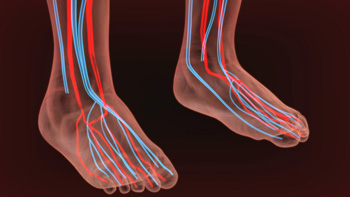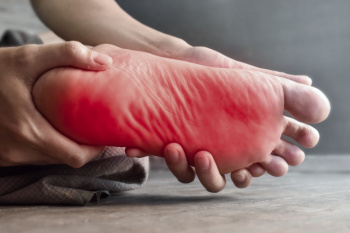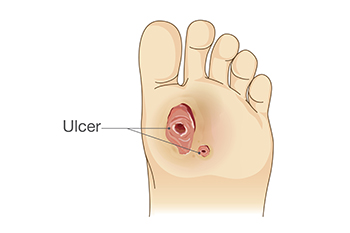Items filtered by date: August 2025
Identifying and Managing Poor Foot Circulation

Poor foot circulation occurs when blood flow to the feet is reduced, often due to conditions like peripheral artery disease, diabetes, or blood clots. Causes include smoking, sedentary lifestyle, high cholesterol, and vascular disease. Risk factors involve aging, obesity, and a family history of circulatory problems. Symptoms may include cold feet, numbness, tingling, swelling, cramping, or skin color changes. Without proper care, poor circulation can lead to wounds that heal slowly or serious complications. A podiatrist can assess circulation, provide treatments to improve blood flow, and recommend lifestyle changes. If you notice persistent changes in your feet or have any of the above symptoms, it is suggested that you schedule an appointment with a podiatrist who can offer you effective relief and treatment solutions.
Poor circulation is a serious condition and needs immediate medical attention. If you have any concerns with poor circulation in your feet contact one of our podiatrists of Pima Foot and Ankle Surgery. Our doctors will treat your foot and ankle needs.
Poor Circulation in the Feet
Poor blood circulation in the feet and legs is can be caused by peripheral artery disease (PAD), which is the result of a buildup of plaque in the arteries.
Plaque buildup or atherosclerosis results from excess calcium and cholesterol in the bloodstream. This can restrict the amount of blood which can flow through the arteries. Poor blood circulation in the feet and legs are sometimes caused by inflammation in the blood vessels, known as vasculitis.
Causes
Lack of oxygen and oxygen from poor blood circulation restricts muscle growth and development. It can also cause:
- Muscle pain, stiffness, or weakness
- Numbness or cramping in the legs
- Skin discoloration
- Slower nail & hair growth
- Erectile dysfunction
Those who have diabetes or smoke are at greatest risk for poor circulation, as are those who are over 50. If you have poor circulation in the feet and legs it may be caused by PAD and is important to make changes to your lifestyle in order to reduce risk of getting a heart attack or stroke. Exercise and maintaining a healthy lifestyle will dramatically improve conditions.
As always, see a podiatrist as he or she will assist in finding a regimen that suits you. A podiatrist can also prescribe you any needed medication.
If you have any questions, please feel free to contact our offices located in . We offer the newest diagnostic and treatment technologies for all your foot care needs.
Are You Suffering From Ingrown Toenails?
Causes and Symptoms of Peripheral Neuropathy in the Feet

Peripheral neuropathy in the feet occurs when nerve damage leads to impaired communication between the brain and the lower extremities. This condition can be caused by diabetes, infections, vitamin deficiencies, autoimmune disorders, or exposure to toxins. Risk factors include uncontrolled blood sugar, excessive alcohol use, and certain medical treatments. Symptoms include numbness, tingling, burning sensations, sharp pain, or loss of balance, which can increase the risk of falls and injuries. A podiatrist can help by performing a thorough evaluation, recommending protective footwear, and providing foot care guidance. If you experience persistent numbness or pain in your feet, it is suggested that you are under the care of a podiatrist who can help you to manage this condition.
Neuropathy
Neuropathy can be a potentially serious condition, especially if it is left undiagnosed. If you have any concerns that you may be experiencing nerve loss in your feet, consult with one of our podiatrists from Pima Foot and Ankle Surgery. Our doctors will assess your condition and provide you with quality foot and ankle treatment for neuropathy.
What Is Neuropathy?
Neuropathy is a condition that leads to damage to the nerves in the body. Peripheral neuropathy, or neuropathy that affects your peripheral nervous system, usually occurs in the feet. Neuropathy can be triggered by a number of different causes. Such causes include diabetes, infections, cancers, disorders, and toxic substances.
Symptoms of Neuropathy Include:
- Numbness
- Sensation loss
- Prickling and tingling sensations
- Throbbing, freezing, burning pains
- Muscle weakness
Those with diabetes are at serious risk due to being unable to feel an ulcer on their feet. Diabetics usually also suffer from poor blood circulation. This can lead to the wound not healing, infections occurring, and the limb may have to be amputated.
Treatment
To treat neuropathy in the foot, podiatrists will first diagnose the cause of the neuropathy. Figuring out the underlying cause of the neuropathy will allow the podiatrist to prescribe the best treatment, whether it be caused by diabetes, toxic substance exposure, infection, etc. If the nerve has not died, then it’s possible that sensation may be able to return to the foot.
Pain medication may be issued for pain. Electrical nerve stimulation can be used to stimulate nerves. If the neuropathy is caused from pressure on the nerves, then surgery may be necessary.
If you have any questions, please feel free to contact our offices located in . We offer the newest diagnostic and treatment technologies for all your foot care needs.
Caring for Diabetic Foot Ulcers

A diabetic foot ulcer is an open wound or sore that typically forms on the bottom of the foot in individuals with diabetes. Poor circulation and reduced sensation increase the risk of skin breakdown, making even minor injuries potentially serious. Proper care includes keeping the ulcer clean, covered, and protected from pressure. Managing blood sugar levels and inspecting the feet daily are also important. A podiatrist provides expert wound care, offloading solutions, and guidance to prevent infection and promote healing. If you have diabetes and notice a sore on your foot, do not delay. It is suggested that you are under the care of a podiatrist who can effectively treat diabetic foot ulcers, and help you to manage this serious condition.
Wound care is an important part in dealing with diabetes. If you have diabetes and a foot wound or would like more information about wound care for diabetics, consult with one of our podiatrists from Pima Foot and Ankle Surgery. Our doctors will assess your condition and provide you with quality foot and ankle treatment.
What Is Wound Care?
Wound care is the practice of taking proper care of a wound. This can range from the smallest to the largest of wounds. While everyone can benefit from proper wound care, it is much more important for diabetics. Diabetics often suffer from poor blood circulation which causes wounds to heal much slower than they would in a non-diabetic.
What Is the Importance of Wound Care?
While it may not seem apparent with small ulcers on the foot, for diabetics, any size ulcer can become infected. Diabetics often also suffer from neuropathy, or nerve loss. This means they might not even feel when they have an ulcer on their foot. If the wound becomes severely infected, amputation may be necessary. Therefore, it is of the upmost importance to properly care for any and all foot wounds.
How to Care for Wounds
The best way to care for foot wounds is to prevent them. For diabetics, this means daily inspections of the feet for any signs of abnormalities or ulcers. It is also recommended to see a podiatrist several times a year for a foot inspection. If you do have an ulcer, run the wound under water to clear dirt from the wound; then apply antibiotic ointment to the wound and cover with a bandage. Bandages should be changed daily and keeping pressure off the wound is smart. It is advised to see a podiatrist, who can keep an eye on it.
If you have any questions please contact our offices located in . We offer the newest diagnostic and treatment technologies for all your foot and ankle needs.

